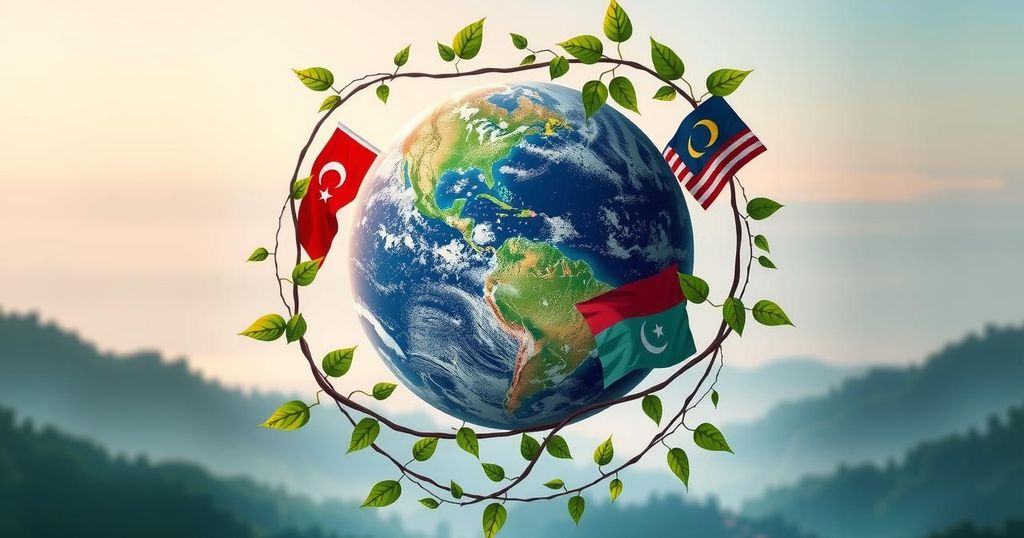Türkiye’s Asia Anew initiative aims to strengthen ties with Malaysia, Indonesia, and Pakistan as crucial allies in Southeast and South Asia. President Erdogan’s visit emphasizes mutual strategic interests and addresses humanitarian concerns, particularly regarding Palestine. The initiative seeks to expand economic, defense, and cultural cooperation, reflecting Türkiye’s ambition to emerge as a significant global power amidst shifting geopolitical dynamics.
Türkiye is strategically positioning itself within three pivotal regions: Southeast and South Asia, through strengthened ties with Malaysia, Indonesia, and Pakistan. These nations regard Türkiye as a dependable ally, particularly in times of external threats, indicating a shared trust that Türkiye would provide timely support if needed.
President Erdogan’s recent diplomatic mission to Malaysia, Indonesia, and Pakistan sought to bolster cooperation and align mutual strategic interests. This initiative, known as Asia Anew, illustrates Türkiye’s attempt to redefine its foreign policy priorities in light of contemporary global challenges, such as humanitarian crises and shifting power dynamics, notably the prospect of Trump’s resurgence in US leadership.
Erdogan’s tour underscored a broader engagement beyond mere economic considerations; it included strategic, defense, and cultural dimensions, reflecting a comprehensive approach to relations with Asia. Türkiye’s focus on these aspects enriches its standing in these nations, revealing that the interactions are not purely transactional but rooted in deeper mutual interests.
Erdogan’s popularity in Malaysia, Indonesia, and Pakistan transcends economic ties. His consistent advocacy for Muslim causes and global issues, alongside Türkiye’s public diplomacy initiatives, enhances his image as a champion for humanitarian concerns. Institutions like TIKA and TRT, alongside influential Turkish media, have effectively propagated Türkiye’s cultural presence, reinforcing Erdogan’s stature in the region.
The choice of Malaysia, Indonesia, and Pakistan stems from their significant geopolitical roles as part of Türkiye’s broader strategy to engage in Asia. The geopolitical landscape is shifting, with China’s growing influence catalyzing global powers to focus on the region. Thus, Türkiye’s alliances in Asia are viewed as crucial for its aspirations to emerge as a global power.
Trade and economic collaboration remain a top priority in Türkiye’s relations with these nations. Malaysia and Indonesia’s status as critical economic players enhances this partnership, while recent defense agreements showcase a mutual interest in expanding cooperation beyond trade to include security and cultural exchanges.
Pakistan is integral to Türkiye’s strategic ambitions, particularly as it seeks to solidify its security interests in Central and West Asia. Strengthening ties with Pakistan would enable Türkiye to enhance its geopolitical influence and establish a robust defense alliance, which could potentially expand to include other regional nations.
Lastly, Erdogan’s tour was not solely grounded in Turkey’s national interests; it was also a platform for advocating humanitarian support, specifically for Palestine. By uniting with Malaysia, Indonesia, and Pakistan on this matter, Türkiye aims to rally international backing for the Palestinian cause against injustices.
In summary, Türkiye’s Asia Anew initiative reflects a multifaceted approach to strengthening relations with key Asian nations, integrating economic, strategic, and cultural elements. By enhancing its partnerships with Malaysia, Indonesia, and Pakistan, Türkiye aims to solidify its role on the global stage while addressing vital humanitarian issues. Erdogan’s leadership resonates strongly in the region, signaling a commitment to mutual support and cooperation. Ultimately, these efforts not only bolster Türkiye’s influence but also contribute to a collective voice advocating for global humanitarian causes, thus redefining the nature of international engagement in the contemporary geopolitical landscape.
Original Source: www.aa.com.tr






